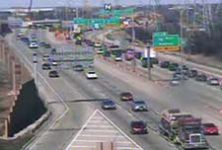Case Summary
A disproportionate number of persons of color in the Milwaukee region are dependent upon public transit to access both jobs and non-employment services, including medical care and schools. According to the Southeastern Wisconsin Regional Planning Commission (SEWRPC), “[o]nly about 68 percent of Milwaukee County Black/African American households indicate that they have an automobile for travel, and only an estimated 60 percent of Black/African American adults have a driver’s license.”
Based in part on these findings, SEWRPC recommended as part of its Regional Transportation System Plan that there be annual increases in transit service and vehicle miles served by transit service in order to reduce highway congestion, connect low-income and minority residents of Milwaukee’s inner-city with jobs elsewhere in the region, and to ensure access to schools, medical care, and other necessary services.
Despite SEWRPC’s recommendations, the region’s public transit services have been slashed. As a result, over the last 12 years the Milwaukee County Transit System has eliminated 21 regular bus routes, 4 freeway flyer routes and numerous route segments, and reduced the frequency and span of many bus routes. While the state reduced its percentage share of operating assistance for the transit system during these years, the Wisconsin Department of Transportation’s (WisDOT) funding for and construction of major highway projects increased exponentially.
The Wisconsin Department of Transportation recently approved plans to expand the Zoo Interchange, one of Wisconsin’s busiest freeway interchanges located just west of Milwaukee, at a cost of about $1.7 billion. A project like the expansion of the Zoo Interchange triggers a number of state and federal laws including the Federal Aid Highway Act, the National Environmental Protection Act, and the Wisconsin Environmental Protection Act. These statutes require WisDOT and USDOT to seriously consider, among other things, the project’s economic, social, and environmental effects and any alternatives that may reduce the project’s negative impacts.
Midwest Environmental Advocates and the ACLU of Wisconsin are representing the Black Health Coalition of Wisconsin and the Milwaukee Inner-city Congregations Allied for Hope in a federal court lawsuit challenging the decision of WisDOT and federal transportation officials to approve the $1.7 billion expansion without including any transit component. The lawsuit alleges, among other things, that WisDOT and USDOT failed to collect and analyze any data relating to the project’s impact on communities of color, failed to evaluate and mitigate issues relating to the transit dependence and segregation of minorities, and refused to include transit plans as part of the reconstruction process, despite the documented need for transit increases to achieve racial equity. In addition, the lawsuit alleges that WisDOT has failed for many years to prepare annual plans for implementing its duty under Title VI of the Federal Civil Rights Act to avoid making programmatic decisions that have disproportionate adverse impacts on minority, low income, and disabled people.
Is public transportation important to you? Tell us why you use transit to get to work, school, medical appointments or other important places. Download and fill out a transit story form - we accept electronic and printed documents.

